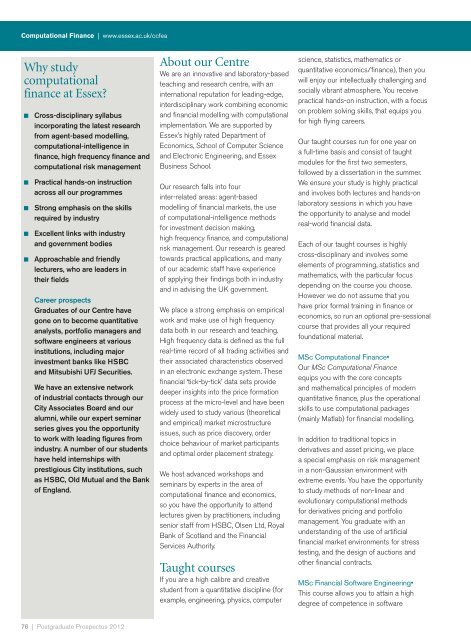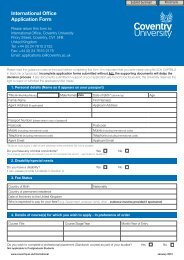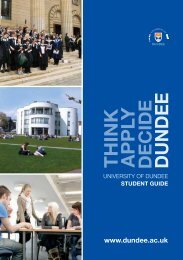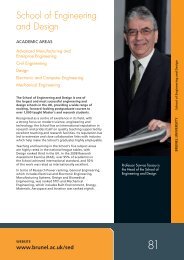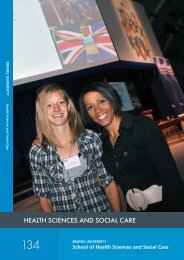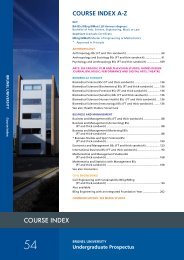Postgraduate Prospectus
Postgraduate Prospectus
Postgraduate Prospectus
You also want an ePaper? Increase the reach of your titles
YUMPU automatically turns print PDFs into web optimized ePapers that Google loves.
Computational Finance | www.essex.ac.uk/ccfea<br />
Why study<br />
computational<br />
finance at Essex?<br />
n<br />
n<br />
n<br />
n<br />
n<br />
Cross-disciplinary syllabus<br />
incorporating the latest research<br />
from agent-based modelling,<br />
computational-intelligence in<br />
finance, high frequency finance and<br />
computational risk management<br />
Practical hands-on instruction<br />
across all our programmes<br />
Strong emphasis on the skills<br />
required by industry<br />
Excellent links with industry<br />
and government bodies<br />
Approachable and friendly<br />
lecturers, who are leaders in<br />
their fields<br />
Career prospects<br />
Graduates of our Centre have<br />
gone on to become quantitative<br />
analysts, portfolio managers and<br />
software engineers at various<br />
institutions, including major<br />
investment banks like HSBC<br />
and Mitsubishi UFJ Securities.<br />
We have an extensive network<br />
of industrial contacts through our<br />
City Associates Board and our<br />
alumni, while our expert seminar<br />
series gives you the opportunity<br />
to work with leading figures from<br />
industry. A number of our students<br />
have held internships with<br />
prestigious City institutions, such<br />
as HSBC, Old Mutual and the Bank<br />
of England.<br />
About our Centre<br />
We are an innovative and laboratory-based<br />
teaching and research centre, with an<br />
international reputation for leading-edge,<br />
interdisciplinary work combining economic<br />
and financial modelling with computational<br />
implementation. We are supported by<br />
Essex’s highly rated Department of<br />
Economics, School of Computer Science<br />
and Electronic Engineering, and Essex<br />
Business School.<br />
Our research falls into four<br />
inter-related areas: agent-based<br />
modelling of financial markets, the use<br />
of computational-intelligence methods<br />
for investment decision making,<br />
high frequency finance, and computational<br />
risk management. Our research is geared<br />
towards practical applications, and many<br />
of our academic staff have experience<br />
of applying their findings both in industry<br />
and in advising the UK government.<br />
We place a strong emphasis on empirical<br />
work and make use of high frequency<br />
data both in our research and teaching.<br />
High frequency data is defined as the full<br />
real-time record of all trading activities and<br />
their associated characteristics observed<br />
in an electronic exchange system. These<br />
financial ‘tick-by-tick’ data sets provide<br />
deeper insights into the price formation<br />
process at the micro-level and have been<br />
widely used to study various (theoretical<br />
and empirical) market microstructure<br />
issues, such as price discovery, order<br />
choice behaviour of market participants<br />
and optimal order placement strategy.<br />
We host advanced workshops and<br />
seminars by experts in the area of<br />
computational finance and economics,<br />
so you have the opportunity to attend<br />
lectures given by practitioners, including<br />
senior staff from HSBC, Olsen Ltd, Royal<br />
Bank of Scotland and the Financial<br />
Services Authority.<br />
Taught courses<br />
If you are a high calibre and creative<br />
student from a quantitative discipline (for<br />
example, engineering, physics, computer<br />
science, statistics, mathematics or<br />
quantitative economics/finance), then you<br />
will enjoy our intellectually challenging and<br />
socially vibrant atmosphere. You receive<br />
practical hands-on instruction, with a focus<br />
on problem solving skills, that equips you<br />
for high flying careers.<br />
Our taught courses run for one year on<br />
a full-time basis and consist of taught<br />
modules for the first two semesters,<br />
followed by a dissertation in the summer.<br />
We ensure your study is highly practical<br />
and involves both lectures and hands-on<br />
laboratory sessions in which you have<br />
the opportunity to analyse and model<br />
real-world financial data.<br />
Each of our taught courses is highly<br />
cross-disciplinary and involves some<br />
elements of programming, statistics and<br />
mathematics, with the particular focus<br />
depending on the course you choose.<br />
However we do not assume that you<br />
have prior formal training in finance or<br />
economics, so run an optional pre-sessional<br />
course that provides all your required<br />
foundational material.<br />
MSc Computational Finance•<br />
Our MSc Computational Finance<br />
equips you with the core concepts<br />
and mathematical principles of modern<br />
quantitative finance, plus the operational<br />
skills to use computational packages<br />
(mainly Matlab) for financial modelling.<br />
In addition to traditional topics in<br />
derivatives and asset pricing, we place<br />
a special emphasis on risk management<br />
in a non-Gaussian environment with<br />
extreme events. You have the opportunity<br />
to study methods of non-linear and<br />
evolutionary computational methods<br />
for derivatives pricing and portfolio<br />
management. You graduate with an<br />
understanding of the use of artificial<br />
financial market environments for stress<br />
testing, and the design of auctions and<br />
other financial contracts.<br />
MSc Financial Software Engineering•<br />
This course allows you to attain a high<br />
degree of competence in software<br />
76 | <strong>Postgraduate</strong> <strong>Prospectus</strong> 2012


